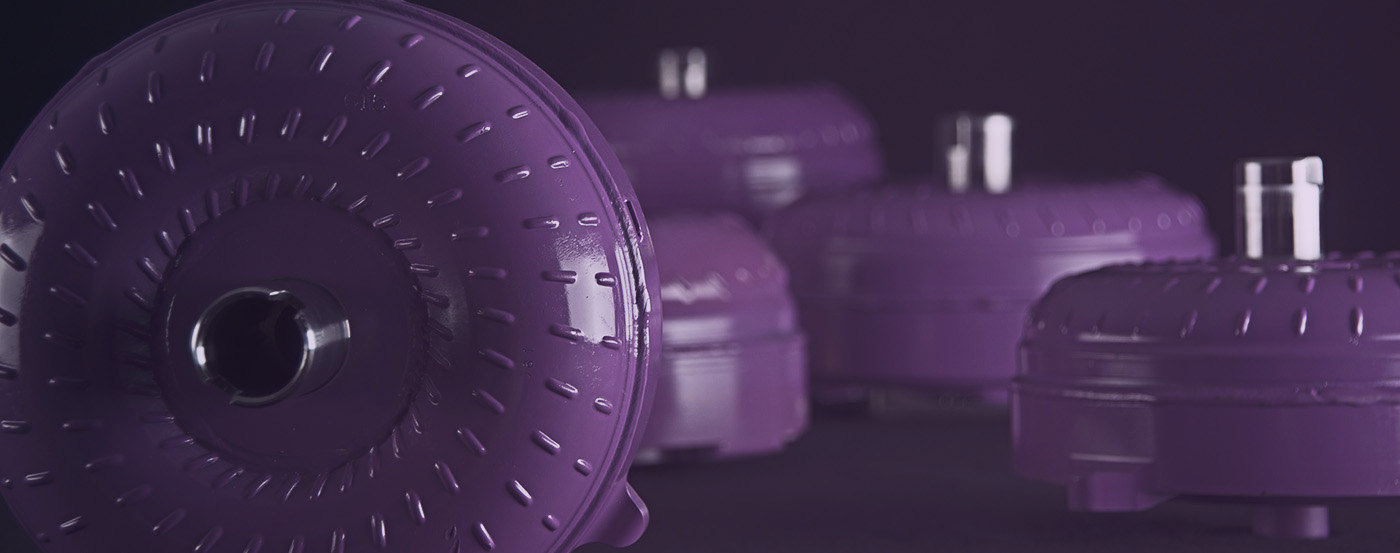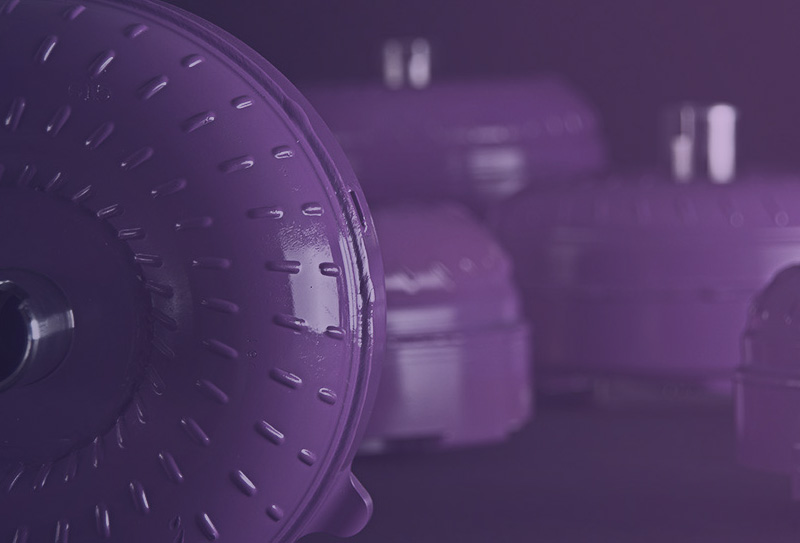

1. The Truth About The 9-12 and 9-11 Spaceship Type Converters
All late model transmissions regardless of make have a clutch in the torque converter. Precision Industries was the first performance torque converter company to design and successfully manufacture a small diameter clutch assembly that would survive the abuses of high performance late model vehicles. We had to manufacture a special front cover, clutch plate and develop a clutch lining that would handle pulse width modulation.
This is the reason we use a special billet front cover not just for the good looks! Our competitors in the performance industry do not have the technical ability or the capability and are just too cheap to follow our lead. They are using all stock front cover and clutch parts designed and built for 4 and 6 cylinder vehicles to compete with Precision Industries. When OBDII appeared they suddenly found out that using these inferior 4 and 6 cylinder front cover and clutch parts was not going to work so they started using 15 year old technology, the so called 9-12 or 9-11 spaceship type of torque converter.
What these torque converters consist of are parts from 1- $10.00 and 1- $35.00 wrecking yard torque converter core along with a steel ring to mate the 2 converters together. Using these parts equates to a value for this type of torque converter to no more than $300.00. While this type of torque converter seemed to solve the torque converter clutch problem it instantly created more serious problems.
One advantage to using a small diameter torque converter is that it has a lot less rotating mass than the stock 12” torque converter and with the thick steel plate to mount the 2 stock torque converter halves together to make the 9-12 you end up with more rotating mass than the stock 12” torque converter.
A more critical problem with the 9-12 spaceship type torque converter is the turbine wash over of this design. The turbine wash over is so strong that the large diameter torque converter clutch is pushed up against the front cover and drags during stall and acceleration.
This action kills acceleration and causes undue stress to the torque converter clutch. What this means is this style of torque converter will never accelerate as well as the small diameter torque converter meaning slower 60 ft. and ET times.
This style of torque converter would probably work satisfactorily in Grandma’s car but is not something you would want for a performance torque converter. Our competitors must be laughing all the way to the bank selling this inferior product for the price they are asking!
2. The Truth About Torque Converter Prices
When talking about high performance street car torque converters a subject that is talked about a lot is price. The people who like low prices make statements like “You get a lot of bang for the buck”. The people who will pay more make statements like “You only get what you pay for”.
Well I think both people are correct to some degree. The low priced person might not like the sound or the feel of the “bang” when he gets it and the higher price payer might not know if he is getting what he paid for. The “Johnny come lately” high performance street torque converter companies are all trying to get in this market. They look at our products that our customers are buying and want a piece of the so-called “gravy” as they see it.
Some of these companies manufacture their own torque converters and some have a stock torque converter rebuilder build their product. These last vendors and their rebuilding companies know nothing about race torque converters or high performance street torque converters and must be thinking there is a “sucker born every minute”. If you investigate their product line you will find that most of their line is re-gutted stock torque converters! They jump in talking BS and throwing around low prices making statements like “just as good as” or “our quality is second to none” all things they cannot backup.
The other amazing part is most of the companies coming from the racing industry side of torque converter building have spent 10, 20 or even 30 years and still do not have a majority share of their own market. Now they are coming to the high performance street converter side of the business to jump in and try to grab market share with a product of less quality and performance.
Some of these newcomers will disappear quickly and some will hang on like a bad cold but in the end if any of these new are going to survive on this side of the business they will have to invest in quality, research and development. Some of the new comers are buying our products and trying to copy the technology but without R&D and knowing the engineering dynamics of torque converter technology they are doomed to always being 2-3 steps behind.
You cannot use existing OEM parts such as stock covers, clutches, lining, hubs, etc. and get a quality part that will operate correctly and dependably in a high performance street torque converter. Our competitors use these types of parts and are charging $500-$700 (more for a higher stall) for a mostly stock 4 or 6 cylinder torque converter. There is no possible way this product is worth any more than $250-$300.
I hear and read comments of how Precision Industries torque converters are over priced and Joe Blows torque converter is just as good. These people know about as much about high performance street torque converters as the young man flipping hamburgers at McDonalds. Don’t feel bad most people that build torque converters for a living don’t know any more about torque converters than the people making the above statements.
The only way the buying public learns about high performance street torque converters is by what is said by some self proclaimed expert or written in the forums on the Internet. This education is like asking a person filing for bankruptcy how to get rich. If you want to know the real facts about torque converters then call the people that manufacture them and don’t depend on someone who thinks he knows torque converters because he bought one for his or her car.
To prove my point I made earlier let us dissect the price of a Precision Industries LS1 single plate torque converter and see who is paying too much, Mr. Low or Mr. High.
A Precision Industries high performance street torque converter sells on average from $699-$750 through most of our dealer network. Precision Industries uses a billet cover, which we manufacture from scratch (most of our competitors do not have this capability) for a cost of around $200. I know the no experienced experts are going to say “no way” does it cost that much but it does. This is why our competitors do not want to use them. They all say, “It is to much money”.
Now let us just remove the cost of this one item and look at what the price of a Precision Industries LS1 high performance street torque converter would sell for. We will have to add the cost of a welded up stock cover because these do cost money to make. I estimated the cost to be $29-$33 for Precision Industries to make one like those used by most lower priced companies. Lets subtract $200 (billet cover) from $750 (dealer selling price), and then add $33 (competitors front cover).
This would make our Precision Industries LS1 high performance street torque converter sell for $583. This is about the price of our low priced competitors. But remember, our Precision Industries LS1 high performance street torque converter still has the 1. Special lockup clutch 2. Special clutch lining 3. Special turbine hub 4. Special braced turbine 5. Special impeller hub mount not counting other differences. I ask you in all honesty “WHO IS PAYING TO MUCH NOW?”
3. The Truth About Warranty and Quality
Over the past couple of years a number of torque converter rebuilders as well as some “Johnny come lately” start up converter rebuilders have entered the high performance street car torque converter market. Both the existing and newbie companies have tried to get in this segment of the market before only to fail due to the drastic differences between racecar torque converters and high performance street torque converters.
Precision Industries has specialized in this market for more than 23 years. Now we are seeing all of these so called expert torque converter builders reappear with there low prices and short warranties. One of the key signs of quality is the length of a products warranty. A warranty shorter than 2 years for a torque converter is a joke! Would you buy a car with a 90 day warranty? The answer is a simple “NO”! The high performance streetcar has more demanding requirements than any race converter. It has to perform in all kinds of weather, temperatures and uses.
1. A typical race torque converter will never see 1000 miles in a lifetime of use while a high performance street torque converter will probably see 100,000 miles in a lifetime of use.
2. A race torque converter will be heated up and cooled less than 1000 times while a high performance street torque converter will see many 1000’s of heat and cool cycles in the lifetime of usage.
3. A race torque converter does not use a lockup clutch but a lockup clutch is one of the most important units in a high performance street torque converter. The typical race torque converter needs to be freshened up every year while a high performance street converter never gets freshened up unless the customer wants to make a stall change or has a transmission failure.
4. A race torque converter operates in an rpm range of 4000 – 8000 rpm with very poor low and mid range capabilities. A high performance street torque converter needs to operate in rpm ranges from 1500 – 6000 rpm with high efficiency and torque multiplication.
5. A race torque converter is only used under full throttle conditions while a high performance street torque converter is used to race, drive short distances, drive long distances, etc. plus be dependable. Most racecars get transported to the track while most high performance streetcars get driven to the track. These are just a few of the reasons why quality is so critical when designing and building a high performance street torque converter. Most companies jumping into the street torque converter market are still using 1960’s technology. Just because a company has been building race torque converters for 50 years does not mean it can build a high performance street torque converter.
Most race torque converters are still being manufactured using ancient technology. By ancient technology I mean stock front covers with welded on rings and pilots, spacer plates to get the impeller hub in the right location, re-broached stock turbine hubs that end up with inferior thin walls, handmade stators with incorrect vane geometry, after thought brazing of turbine vanes that cause imbalance and disturb oil flow, 4 and 6 cylinder low capacity lockup clutches and OEM type friction material. New technology includes steel billet front covers, high capacity clutches designed for V8 engines, friction material that will handle the rigors of pulse width modulation, impeller hub mountings designed for the application, thick walled turbine hubs designed for the application and turbines with 31 specially designed furnace brazed braces to prevent failure and not disturb oil flow.
These new technologies are an absolute necessity for high performance street torque converters to be dependable and to last. The billet front cover was designed to allow for exact perpendicularity between pilot and the mounting pads and bolt circle. This is virtually impossible using a stock 245 torque converter cover due to all of the distortion of adding a mounting ring and pilot.
The billet cover is also designed to allow for more clutch friction contact area something that is impossible with a stock type front cover. A stock 12″ torque converter that originally came in the car has 19.7921″ of contact area, a stock 245 mm torque converter cover has 16.4867″ of contact area and our steel billet cover and special clutch has 37.1101″ of contact area. For a 245 mm torque converter clutch to hold a modified V8 it will need to have 40 percent more area of contact than a 12″ torque converter. Yes, the 245 mm clutch will hold for a short period of time but not for very long.
This might be one of the reasons for the short warranty our competitors offer. If these 245 mm OEM stock torque converter parts are so good why doesn’t GM use these parts in a stock low horse powered LS1? The other part of this scenario I hear all the time is “The warranty is only 90 days but I will take care of you for a year”. This is another comical statement because the person making this statement is probably not the owner and may not even be working there next month.
REMEMBER!!!! All company polices are in writing, if you do not read “1 YEAR WARRANTY” then you do not have a 1 year warranty. Precision Industries is so confident in the QUALITY of our product that we offer a “2 YEAR UNCONDITIONAL WARRANTY” in writing.
4. The Truth about Stall Torque Ratio
STR has been talked and argued about for many years. The following information is what we at Precision Industries have found by doing our own testing to be helpful for you to try to understand this subject.
Our competitors must have a crystal ball to figure the STR of their torque converters. There are a couple of companies in the performance torque converter business that do have the capability to test STR, MOST DO NOT! Precision Industries happens to be one that does have. Our test dyno has the capability to test from 200 ft. lbs. of torque up to 900 ft. lbs. of torque. The other companies use dynamometers that vary from 100 ft. lb. of torque to approximately 300 ft. lb. of torque. There is an old GM printed sheet that has floated around our industry for about 10 years showing the STR of stock GM torque converters that were built back then.
Our competitors either use this sheet or are guessing because they have no way of knowing what the STR really is. They also advertise STR’s of 2.7, 2.9, 3.0, 3.2, etc. this is pure BS. All torque converter companies use the impellers, turbines and stators that come in the factory torque converters. In our tests we have never seen an STR over 2.55. Precision Industries do have torque converters with STR over 2.55 but these units have specially machined stators in them and are not worth the high cost for a street/strip application. If our competitors try to tell you differently just ask them to show you a picture of their test machine, not just a printout. The formula for STR is EXACT OUTPUT TORQUE ÷ EXACT INPUT TORQUE = STR.
This requires a known power source and a data recovery system. STR is just what the name implies. The ratio of torque multiplication at stall. As soon as the turbine rotates (car moves) the ratio starts dropping rapidly until enough RPM has been reached for the ratio to drop to 1:1. The RPM that the ratio reaches 1:1 varies depending on other factors in and out of the torque converter such as impeller exit angle, stator design, impeller to turbine clearance, input torque (engine), etc. A fact that most everyone overlooks is that a torque converter does not make torque! It takes the torque the engine produces and multiplies it for a very short period of time. This is why some cars perform better than others with the same torque converter.
Some car enthusiasts put all kinds of money in the engine, transmission, torque converter, NOS, rear end gears, etc. then want to cripple the torque converter by lowering the STR to try and prevent wheel spin on take off. This is as foolish as pulling off one of the plug wires. Why don’t they finish the project and work on the rear suspension? Trying to tune your car by using STR is probably not very smart seeing how our competitors don’t have a clue about what STR their converters have, after all the stock torque converter you took out of your car has a STR of 1.9-1.94.
The best way to get the right torque converter for your car is to buy it from a company that has a large database of previous sales for your kind of car. Then tell the sales person what mods you have made and what mods you intend to make and let that person help with the decision.
The key words here are large database. The “Johnny come lately companies” have no large database or experience with what works with these late vehicles. Why try to reinvent the wheel with your hard earned money when there is bound to be someone in our database that has the same mods as you do and their torque converter/engine combination ROCKS! At Precision Industries we found out 10 years ago that STR is not the most important consideration when deciding on a torque converter it is the whole COMBINATION!
